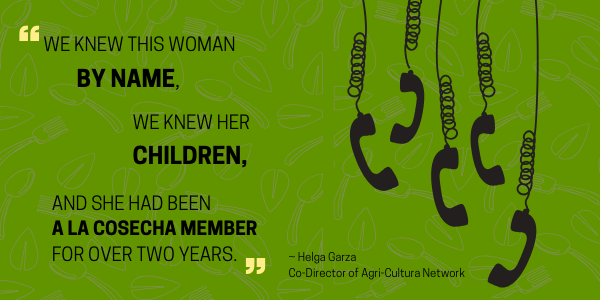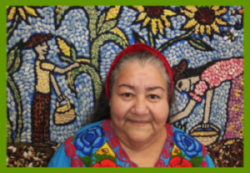Oct
21
2019
Written by Helga Garza
The Common Good Action Project is a cohort-based program that BMP developed to support nonprofit leaders in New Mexico to learn how to align their direct service work with their social change values and mission. In the current iteration of the project, CGAP 2.0, BMP is working to help groups such as Agri-Cultura Cooperative Network implement client engagement strategies so that clients have a more active, influential role in organizational decision-making.
My name is Helga Garza and I am a Native woman leading in agriculture and food and land use justice. I serve as the Executive Director of Agri-Cultura Cooperative Network, a farmer/owner cooperative that consists of nine South Valley of Albuquerque family-owned farms and coordinates a network of thirty-two allied urban and rural Rio Grande community small farms, all of which use organic and sustainable practices. Over ten years, Agri-Cultura Cooperative Network has developed a farm-to-market system with production capacity that provides fresh local produce to the Albuquerque School District, the University of New Mexico Hospital, La Montañita Co-op (a local grocery store), specialty restaurants, and to over 300 members of La Cosecha CSA, a project of the Cooperative Network. This local investment in our agricultural practices builds community assets and strengthens local production along the value chain. It also provides economic activity while strengthening our collective efforts in developing a sustainable local food system. Agri-Cultura Cooperative Network’s vision is rooted in food justice–we practice a bottom up approach to organizing, we are mission driven, and we work with the principle of self-determination.
At our Building Movement Cohort meeting held in Albuquerque New Mexico this past August, the meeting started with a question regarding immigration and current policy regarding family separations, asylum, and how that was affecting our work. The shootings at the El Paso Wal-Mart had also just happened. So, the emotion that was tapped into with that opening question caused us to reflect. With a room full of compassionate people committed to social change, the responses were heartfelt. For me, this question hit so deep that I had to shed some tears…
As I gathered my thoughts and got a grip on my emotions, I began to tell the story of a recent incident. I reminded everyone that La Cosecha CSA does not ask for immigration status or proof of income; clients can join the program if they live within our focus communities and/or have children between the ages of zero and eight. The La Cosecha season runs from June to October. Week 12 began with a regular office day of farm-to-market production. Suddenly, we received a phone call from a La Cosecha member who had been deported and was in Juarez, Mexico trying to figure things out. We knew this woman by name, we knew her children, and she had been a La Cosecha member for two years. As we spoke with her over the phone, she told us about her deportation and how her children were OK for the time being in their rented house with relatives. She gave us the phone numbers of relatives and the children’s school counselor. Her main concern was to explain why she hadn’t stopped by La Cosecha in the past two weeks, and she asked if her children could still have access to the weekly bags of produce. We comforted her and assured her that her children could come with their relatives and pick up the weekly bags for the remainder of the season.

The La Cosecha manager, Bonnie Thornton, and I have experienced first-hand the effects of current immigration policy on families and communities. As mothers ourselves, we could not even attempt to imagine the emotional state of mind of the La Cosecha member who was separated from her children. During our phone call, she went on to tell us how she was attempting to navigate Juarez, Mexico, an unfamiliar city in which she has no family. Her story affected me deeply because of my own trauma as a child, and into adulthood, of having family members deported, visas denied and/or canceled, and everything else we must go through just to maintain our traditions and ceremonial way of life. So, yes, the question that day hit me hard and I shed tears as I told the story of the La Cosecha member and how the current immigration policies and crisis are affecting our work.
La Cosecha CSA (Community Supported Agriculture) is the non-profit 501c3 program of Agri-Cultura Cooperative Network that provides food access, nutrition education, and community driven market development. La Cosecha also provides local organic produce to more than 300 low-income members from the South Valley of Albuquerque, International District, Martinez Town, San Jose, and the Barelas community on a weekly basis. During our 20-week season La Cosecha CSA distributes bags of local produce to families and the elderly in need of healthy fruits and vegetables. Distribution takes place by collaborating with eight community partners, including non-profits, faith-based organizations, community clinics, and community members.
Agri-Cultura Network and La Cosecha CSA are committed to community engagement. The development of our community driven markets is made possible through the various collaborations and partnerships mentioned above. As part of our quest to continue to grow within our community and provide opportunities for professional staff development, we take part in the Building Movement Project’s Common Good Action Project (CGAP) cohorts, which are made up of diverse, local nonprofit organizations. Through the cohort experience, we learn about and practice with tools and resources to strengthen our focus on community engagement as well as leadership development within our organizations and the community, so that we can be most effective in our social change work.
I am a Native woman of Coahuiltecan and Azteca-Chichimeca descent. I speak my Native language of Nahuatl and follow the ancestral agricultural ceremonial calendar. My life experiences have been intertwined with immigration policy and with the historical bias of the Rio Grande border region and its effects on the original people of the land. My mother’s ancestry is of the Coahuiltecan Native People of the Mission San Francisco De La Espada in San Antonio, Tejas and my father’s lineage is Azteca-Chichimeca from Guerrero Mexico. I grew up with the oral history of our migration stories, the ceremonial practices of my Coahuiltecan Azteca Chichimeca ancestry, and the memory of words of truth passed down from my mother, grandmother, and great-grandmother:
“We didn’t cross the border—the border crossed us!”

